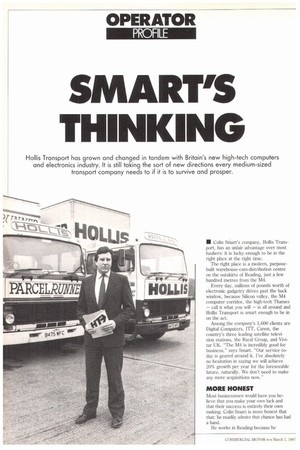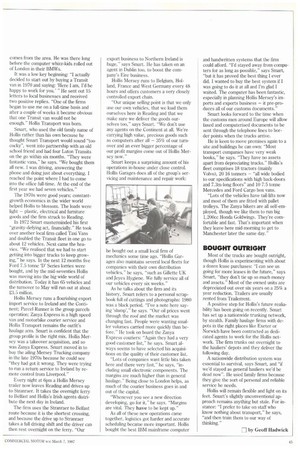SMART'S THINKING
Page 46

Page 47

If you've noticed an error in this article please click here to report it so we can fix it.
Hollis Transport has grown and changed in tandem with Britain's new high-tech computers and electronics industry. It is still taking the sort of new directions every medium-sized transport company needs to if it is to survive and prosper.
• Colin SMart's company, Hollis Transport, has an unfair advantage over most hauliers: it is lucky enough to be in the right place at the right time.
The right place is a modern, purposebuilt warehouse-cum-distribution centre on the outskirts of Reading, just a few hundred metres from the M4.
Every day, millions of pounds worth of electronic gadgetry drives past the back window, because Silicon valley, the M4 computer corridor, the high-tech Thames — call it what you will — is all around and Hollis Transport is smart enough to be in on the act.
Among the company's 1,600 clients are Digital Computers, ITT, Canon, the country's three leading satellite television stations, the Racal Group, and Vivitar UK. "The M4 is incredibly good for business," says Smart. "Our service today is geared around it. I've absolutely no hesitation in saying we will achieve 20% growth per year for the foreseeable future, naturally. We don't need to make any more acquisitions now."
MORE HONEST
Most businessmen would have you believe that you make your own luck and that their success is entirely their own making. Colin Smart is more honest that that: he readily admits that chance has had a hand.
He works in Reading because he comes from the area. He was there long before the computer whizz-kids rolled out of London in their BMWs.
It was a low key beginning: "I actually decided to start out by buying a Transit van in 1970 and saying: 'Here I am, I'd be happy to work for you.' "He sent out 15 letters to local businesses and received two positive replies. "One of the firms began to use me on a full-time basis and after a couple of weeks it became obvious that one Transit van would not be enough." Hollis Transport was born.
Smart, who used the old family name of Hollis rather than his own because he thought Smart Transport would sound "too cocky", went into partnership with an old school friend and had four Luton Transits on the go within six months. "They were fantastic vans," he says. "We bought them all new. I was driving, answering the phone and doing just about everything. I reached the point where I had to come into the office full-time. At the end of the first year we had seven vehicles."
The 1970s were good years; constantgrowth economics in the wider world helped Hollis to blossom. The loads were light — plastic, electrical and furniture goods and the firm struck to Reading.
In 1972 Smart masterminded his first "gravity-defying act, financially." He took over another local firm called Taxi Vans and doubled the Transit fleet in one go to about 12 vehicles. Next came the heavies. "We realised that we had to start getting into bigger trucks to keep growing," he says. In the next 12 months five Ford 7.5 tonne 'D' Series lorries were bought, and by the mid-seventies Hollis was moving into the big wide world of distribution. Today it has 65 vehicles and the turnover to May will run out at about 2.3.5 million.
Hollis Mersey runs a flourishing export import service to Ireland and the Continent; Parcel Runner is the group parcels operation; Zanya Express is a high speed van and motorbike courier service and Hollis Transport remains the outfit's haulage arm. Smart is confident that the group profile is the right mix. Hollis Mersey was a takeover acquisition, and so was Zanya Express. Smart moved in to buy the ailing Mersey Trucking company in the late 1970s because he could see "they had got it wrong. They were trying to run a return service to Ireland by remote control from Liverpool."
Every night at 6pm a Hollis Mersey trailer now leaves Reading and drives up to Stranraer. It takes the overnight ferry to Belfast and Hollis's Irish agents distribute the next day in Ireland.
The firm uses the Stranraer to Belfast route because it is the shortest crossing, and because the drive up to Stranraer takes a full driving shift and the driver can then rest overnight on the ferry. "Our
export business to Northern Ireland is huge," says Smart. He has taken on an agent in Dublin too, to boost the company's Eire business.
Hollis Mersey runs to Belgium, Holland, France and West Germany every 48 hours and offers customers a very closely controlled export chain.
"Our unique selling point is that we only use our own vehicles, that we load them ourselves here in Reading and that we make sure we deliver the goods ourselves too," says Smart. "We don't use any agents on the Continent at all. We're carrying high value, precious goods such as computers after all — 35% of our turnover and an ever bigger percentage of our profit margins come out of Hollis Mersey now."
Smart keeps a surprising amount of his operations in-house under close control. Hollis Garages does all of the group's servicing and maintenance and repair work: he bought out a small local firm of mechanics some time ago. "Hollis Garages also maintains several local fleets for companies with their own distribution vehicles," he says, "such as Gillette UK and Jeyes Hygiene. We fully service all of our vehicles every six weeks."
As he talks about the firm and its history, Smart refers to a personal scrapbook full of cuttings and photographs: 1980 was a black period. "I've a note here saying 'slump'," he says. "Our oil prices went through the roof and the market was changing fast. People were wanting smaller volumes carried more quickly than before." He took on board the Zanya Express couriers: "Again they had a very good customer list," he says. Smart always seems to have selected his acquisitions on the quality of their customer list.
"Lots of companies want little bits taken here and there very fast," he says, "including small electronic components. The margins are much higher than in general haulage." Being close to London helps, as much of the courier business goes in and out of the capital.
"Whenever you see a new direction developing, go for it," he says. "Margins are vital. They have to be kept up."
As all of these new operations came together, logistics got harder and accurate scheduling became more important. Hollis bought the best IBM mainframe computer and handwritten systems that the firm could afford. "I'd stayed away from computers for as long as possible," says Smart, "but it has proved the best thing I ever did. I wanted to buy the best system if I was going to do it at all and I'm glad I waited. The computer has been fantastic, especially in planning Hollis Mersey's imports and exports business — it pre-produces all of our customs documents."
Smart looks forward to the time when the customs men around Europe will allow faxed and computerised documents to be sent through the telephone lines to border points when the trucks arrive.
He is keen to move premises again to a site and buildings he can own: "Most transport companies have very weak books," he says. "They have no assets apart from depreciating trucks," Hollis's fleet comprises 18 tractors (mainly Volvo), 20 16 tonners — "all wide bodied to our specifications with high back-doors and 7.3m-long floors" and 10 7:5 tonne Mercedes and Ford Cargo box vans.
"Lots of the vehicles have tail-lifts now and most of them are fitted with pallet trolleys. The Zanya bikers are all self-employed, though we like them to run big 1,200cc Honda Goldwings. They're comfortable and fast. That's important when they leave here mid-morning to get to Manchester later the same day."
BOUGHT OUTRIGHT
Most of the trucks are bought outright, though Hollis is experimenting with about a dozen lease purchases: "I can see us going for more leases in the future," says Smart, "they don't tie up so much money and assets." Most of the owned units are depreciated out over six years on a 25% a year reduction, Trailers are usually rented from Trailerrent.
A positive step for Hollis's future realiability has been going on recently. Smart has set up a nationwide trunking network, by stealth. Family haulage firms with depots in the right places like Exeter or Norwich have been contracted as dedicated agents to work for the Hollis network. The firm trunks out overnight to the hauliers' depots and they deliver the following day.
A nationwide distribution system was essential to survival, says Smart, and "if we'd stayed as general hauliers we'd be dead now". He used family firms because they give the sort of personal and reliable service he needs.
Hollis will remain flexible and light on its feet. Smart's slightly unconventional approach remains anything but stale. For instance: "I prefer to take on staff who know nothing about transport," he says, ''and then train them to our way of thinking."
by Geoff Hadwick












































































































